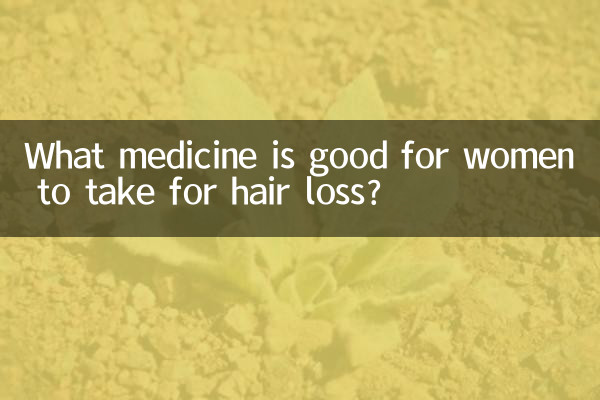What medicine is good for women to take for hair loss?
In recent years, hair loss has gradually become a focus of concern for women. Whether it's stress, hormonal changes, or poor nutrition, hair loss can occur. In response to this problem, many women hope to improve their hair loss through medication. This article will combine the hot topics and hot content on the Internet in the past 10 days to provide you with a detailed introduction to the common causes of female hair loss and applicable drug treatment options.
1. Common causes of hair loss in women

There are many causes of hair loss in women. Here are some common causes:
| Reason | Description |
|---|---|
| Hormone changes | Hormone fluctuations such as pregnancy, menopause, or thyroid dysfunction can cause hair loss. |
| Malnutrition | Lack of key nutrients such as iron, zinc, and vitamin D can affect hair health. |
| Too much pressure | Long-term mental stress may lead to telogen effluvium, where hair enters the shedding stage prematurely. |
| genetic factors | Women with a family history of hair loss are more likely to develop similar problems. |
| scalp problems | Conditions such as scalp inflammation and seborrheic dermatitis can also cause hair loss. |
2. Drug treatment options for female hair loss
For female hair loss, your doctor may recommend the following medications or supplements:
| Drug name | Mechanism of action | Applicable people | Things to note |
|---|---|---|---|
| Minoxidil | Promote blood circulation to hair follicles and stimulate hair growth. | Suitable for women with mild to moderate hair loss. | It requires long-term use, and the effect may disappear after stopping the drug. |
| Spironolactone | Suppresses androgens and reduces hair loss. | Suitable for women with hormonal hair loss. | It is forbidden for pregnant women and requires medical supervision. |
| iron supplements | Improve iron deficiency anemia and promote hair growth. | Suitable for women with hair loss caused by iron deficiency. | Iron levels need to be checked as excessive intake is harmful. |
| Vitamin D supplements | Regulate hair follicle growth cycle and reduce hair loss. | Suitable for women with vitamin D deficiency. | Vitamin D levels need to be checked regularly. |
| Biotin | Promote keratin synthesis and improve hair quality. | Suitable for hair loss caused by malnutrition. | Need to be used in conjunction with other B vitamins. |
3. Assistive improvement measures in life
In addition to medication, women can also improve their hair loss problems by:
| measures | Specific methods |
|---|---|
| balanced diet | Eat more foods rich in protein, iron, zinc, and vitamins, such as lean meat, fish, nuts, etc. |
| reduce stress | Relieve stress through yoga, meditation, exercise, and more. |
| Gentle hair care | Avoid frequent perms and dyeing and use mild shampoo to reduce hair damage. |
| regular massage | Scalp massage can promote blood circulation and stimulate hair follicle growth. |
4. When do you need medical treatment?
If the hair loss problem is severe or lasts for a long time, it is recommended to seek medical treatment in time. The following situations require special attention:
5. Summary
The causes of hair loss in women are complex and diverse, and drug treatments need to be selected based on the specific reasons. Drugs such as minoxidil and spironolactone are effective for specific types of hair loss, but they need to be used under the guidance of a doctor. At the same time, improving living habits and dietary structure can also help alleviate hair loss problems. If hair loss is severe or persists, it is recommended to seek medical treatment promptly to avoid delaying treatment.

check the details

check the details